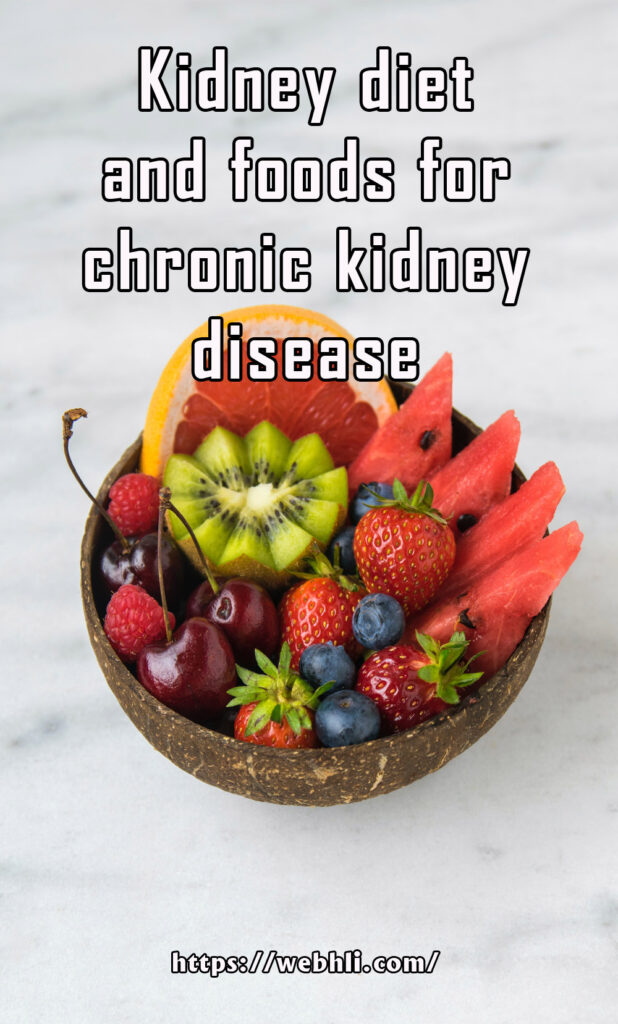The necessity of following the Kidney diet for patients with chronic kidney disease is the failure of the kidney to perform its function as it should, which causes the accumulation of fluids and waste in the body, which leads to serious health problems in the body.
The diet of patients with renal insufficiency is based on determining the amount of fluids and minerals that are consumed; To prevent the accumulation of waste and prevent its consequences from various health problems in the heart, bones and others.
Kidney diet and foods for chronic kidney disease
Kidney diet for patients with chronic kidney disease depend on limiting the consumption of some nutrients, as follows:
1 Sodium
Reducing sodium intake is one of the most important dietary guidelines for patients with renal insufficiency; High sodium consumption causes thirst, which leads to high blood pressure, increased damage to the kidneys, and an increased burden on the heart.
Sodium is mainly found in table salt and is also found in many processed foods; Therefore, the following steps must be taken to reduce sodium consumption:
Do not add salt to your food when cooking or eating.
Avoid foods high in salt, such as cured meats, smoked fish, instant noodles, pickles, salty sauces, and salted nuts.
Be careful using "salt substitutes" and foods with "less sodium"; As many of these foods may contain a large amount of potassium, which causes many problems.
2 Potassium
Forpatients with chronic kidney diseases, potassium may build up in the blood, causing changes in how the heart beats, increasing the risk of a heart attack.
Potassium is found in some of the following foods, vegetables and fruits:
Bran breakfast cereal.
molasses;
cantaloupe;
orange;
Orange juice, grapefruit juice, and peach juice.
Tomatoes, tomato sauce and tomato juice.
dried beans;
Cooked green vegetables, such as spinach and kale.
When eating potatoes and sweet potatoes, they must be peeled and cut into small pieces, then soaked in a large amount of water for several hours, then removed from the water and cooked in a large amount of water, then filtered from the water and eaten.
3 Phosphorous
High amounts of phosphorus in the blood lead to weak bones; Therefore, the consumption of phosphorous should be reduced.
What is the best diet for chronic kidney disease?
What is the latest treatment for diabetes?
Among the foods rich in phosphorous are:
Whole grain bread.
Oats and bran breakfast cereals.
Nuts and sunflower seeds.
Some soft drinks are dark in color.
Foods with low phosphorous content include:
Bread made from sourdough.
Breakfast cereal made from rice or corn.
Unsalted popcorn.
Some light-colored soft drinks and lemonade.
4 Proteins
One of the dietary guidelines for patients with renal insufficiency is to limit the intake of proteins; Because high levels of protein intake put an extra burden on the kidneys, adding to the existing damage.
Of the foods rich in protein, we mention poultry, eggs, red meat and fish, and of foods that are low in protein, we mention bread, pasta, rice, vegetables and fruits.
5 Carbohydrates
Carbohydrates are an important source of energy, and healthy sources of carbohydrates are fruits and vegetables, while bad sources are many, such as sugar, sweets, and various drinks.
However, it should be noted that some carbohydrate sources may contain high amounts of potassium and phosphorous; That is why it is always recommended to consult a nutritionist to find out the best carbohydrate sources.
6 Phosphate
Phosphate accumulation in the body may lead to many problems, such as dry skin and itching, stiff blood vessels, joint pain and muscle weakness; For this reason, foods rich in phosphates should be avoided, such as:
Dairy products and ice cream.
Calcium-fortified milk.
Peanut Butter.
Sardines.
Soft drinks.
- Fat
The high level of fats, especially saturated ones, makes the body more susceptible to heart disease; That is why you should reduce saturated fats such as butter and lard, and choose unsaturated fats such as olive oil, corn oil and peanut oil.


 Protected by Patchstack
Protected by Patchstack